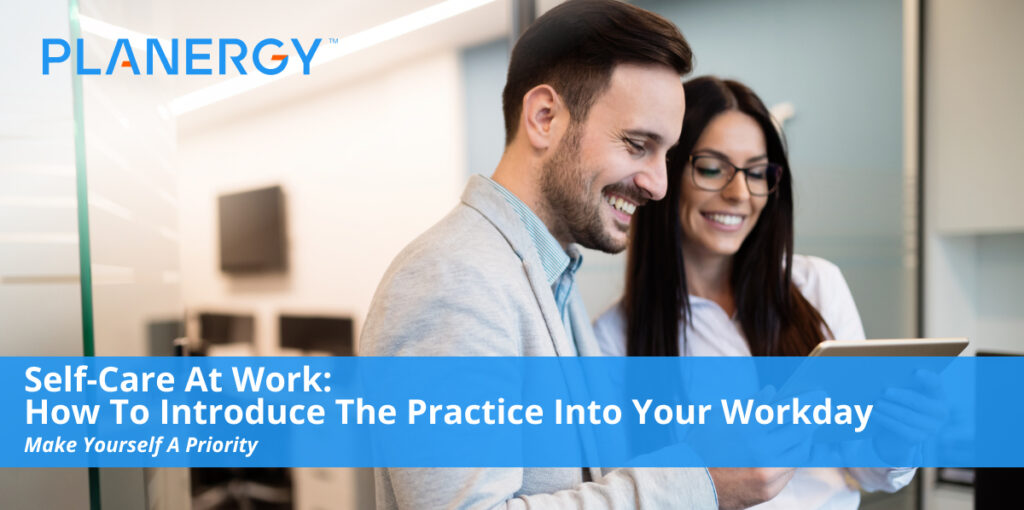The concept of well-being in the workplace has traditionally been limited to, or at least focused primarily on, the physical safety and wellness of employees.
Fire codes and OSHA compliance and other measures seek to protect staff from harm, but in a complex and uncertain global economy where the COVID-19 pandemic has radically redefined work and life norms, it’s well past time to consider the emotional and mental health of workers, too.
For many of us, this consideration starts with ourselves.
Practicing self-care at work means more than staying physically safe; it means investing time and resources in mindful, proactive practices that help you maintain healthy habits (and a healthy perspective) so you can be at your best when it’s time to get down to business—and lead a balanced life while you’re at it.
Why Practicing Self Care at Work Matters
Thousands of years before millennials transformed self-care into a multi-billion-dollar industry, The ancient Greeks saw self-care as an essential part of life.
Practicing philautia, or “the love of self” in healthy ways was seen as foundational to caring for others and contributing positively to one’s family and society.
Today, the World Health Organization (WHO) models self-care as a lynchpin supporting the wheel of personal and interpersonal engagement for each person.
The theory driving this model is simple: a person who attends to their health and mental well-being while supported by a society that prioritizes this care will be much better equipped to contribute positively to the lives of others, the society they live in, and their place of employment.
The more people in a society who practice self-care and systems that support it, the more productive, happy, and healthy that society will be.
Such ambitions can be a powerful motivator even in the best of times, but taking the time to practice self-care in a world that’s still struggling to find its feet in an ongoing global pandemic and a seemingly endless series of complex environmental and sociopolitical issues is essential.
Properly applied, self-care reduces stress, improves cognitive function, and boosts your physical endurance, and can help provide some much-needed perspective. Self-care helps you balance work and life so you really can get more done in a day while living a happier, healthier life, too.
The ancient Greeks saw self-care as an essential part of life. Practicing philautia, or “the love of self” in healthy ways was seen as foundational to caring for others and contributing positively to one’s family and society.
Incorporating Self-Care at Work: Helpful Habits
No two people will encounter the same stressors in their workday. Similarly, not all self-care practices will work equally well for every person.
But at the end of the day, by following a few simple best practices, you can find the sweet spot and develop (or return to!) a self-care regimen that works for you.
Know Your Triggers
Self-awareness is the first step to effective self-care. What stresses you out? Deadlines? Poor communication? Adapting to remote work with unfamiliar technology? Too many people? Not enough human contact?
Whatever the answer, recognizing and documenting your stressors lets you begin developing a plan to mitigate or avoid them.
Get Physical
As the Romans might’ve said, mens sana in corpore sano: A healthy mind in a healthy body. Toning up your tummy or building your endurance are only part of the reason to get moving.
Regular exercise—even if you spread it out over time, in small increments—boosts your mood as well as your physical health and can have a powerful impact on your memory, creativity, and alertness.
Exercise also helps you sleep better, and studies show that high-quality sleep improves your abilities and mood while you’re awake, and also fights weight gain.
Incorporating exercise and fresh air into your daily routine fights dementia and depression. It also slashes your risk for chronic ailments like diabetes, heart disease, and stroke.
Mixing aerobic, strength, and flexibility exercises into your workday can help keep things interesting so you stay committed.
Take a walk at lunchtime to help digestion and avoid the afternoon “blahs.” You can also incorporate exercise into your day by taking calls on your treadmill or exercise bike.
And if, like so many others, you’re working from home, don’t forget to include physical tasks such as cleaning, raking leaves, shoveling snow, etc. in your exercise total for the day. Anything that gets you sweating fits the bill.
Tap into People Power
Life during a pandemic makes socializing in person more difficult than it used to be.
But you can still keep your energy high, improve your mood, and protect your emotional health by maintaining contact with people who share your commitment to honesty, positivity, and shared success.
This applies to both work relationships and those you maintain with friends and loved ones.
Take the time to connect with friends and loved ones during breaks in the workday.
Make sure you’re investing time and energy into building and maintaining strong, happy, healthy relationships with the people who matter most in your life.
On the other side of the coin, don’t forget that boundaries extend to interpersonal connections, too.
Try to keep the energy vampires at bay, and prioritize working with folks who contribute to your shared success instead of hampering it.
Refresh Your Workspace to Refresh Your Headspace
As with exercise, a workspace that’s optimized to meet your physical, mental, and emotional needs can improve your mood and performance considerably.
Incorporate inspiring elements into your workspace (e.g., photos, artwork, flowers, etc.), make sure you have a comfortable and clean work area, and be mindful of both ergonomics and aesthetics.
Chances are you spend a lot of time in your work area, so make sure it’s one that encourages and welcomes your best self.
Consider adding elements, like a standing desk or meditation pillow, to support the practices you use to improve your physical and mental health.
Watch out for Self-Sabotage (and Its Friends)
Periods of extreme stress and uncertainty can make it hard to maintain the mindfulness necessary to practice self-care effectively. Keep an eye out for:
- Self-Sabotage is motivated by anxiety or fear (of both success and failure!) and can take many forms; procrastination, mindless distractions, etc. Practicing mindfulness and time management can help you notice when you’re shooting yourself in the foot to avoid negative feelings.
- Self-Neglect can happen all too easily without firm boundaries and a strong commitment to work-life balance and a satisfying personal life. An ever-growing pile of projects or unceasing requests for more, more, more from coworkers, friends, and even your loved ones can make it tempting to put yourself on the back burner. Skipping sick leave, neglecting commitments to family and friends to work, and choosing greasy treats over healthy snacks are all signs you’ve put yourself last.
Don’t be afraid to say “no” when you must. Be honest about your capacity. Set and enforce firm limits on your time and availability, and make regular breaks—both scheduled and impromptu—part of your day. - Self-Policing, when taken to extremes by the need to meet perceived expectations or from fear created by imposter syndrome, can force us to sacrifice our health, time, resources, and happiness in order to maintain a specific image. Ironically, this will not only leave you exhausted, but may actually cause others to question your abilities and skills if the cracks in the superhuman facade begin to show.
Give yourself a break. Understand that human beings make mistakes, everyone has challenges and frustrations, and martyrdom hurts everyone involved. Remind yourself of the great things you’ve already accomplished—literally. Write down three or four benchmarks you’ve hit, or projects you’ve completed, or deadlines you’ve met, and recognize just how capable you really are.
And when you’re feeling overwhelmed, remember: communication is key. Don’t be afraid to ask for help when genuinely you need it. Honest requests for assistance show others you respect their abilities and trust them to help. Setting aside the hero’s crown and collaborating with your coworkers can help you build stronger relationships, too—an important asset in fair times and
Taking Care of Business Starts with Taking Care of Yourself
In a busy, stressful world that’s likely to get even busier and more stressful in the years ahead, you’ll need to be at your best to avoid burnout, have satisfying interpersonal relationships, and achieve your personal as well as professional goals.
By practicing self-care with mindfulness and consistency, you can make a powerful impact at work, achieve better work-life balance, and work toward your personal goals for productivity, authenticity, and satisfaction as your very best self.




